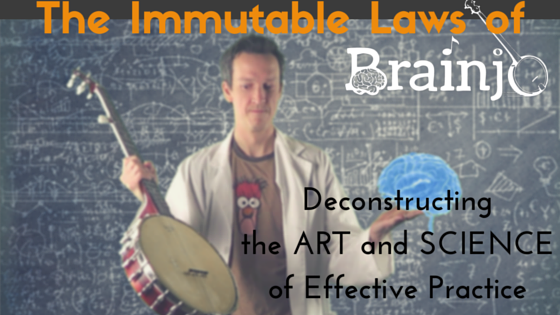
Episode 26: To Become An Expert, Stay A Beginner
Recently, after having received several requests for it as a “Tune and Tab of the Week” installment, I set out to learn Steve Martin’s “clawhammer medley.” The medley consists of four classic old time tunes Martin used to play in series during his comedy performances.
(RELATED: Click here to sign up for the free tune and tab of the week.)
The tunes are played out of an open D tuning, aDAF#D, which is not a tuning I’ve spent much time in.
In fact, while I’ve played the occasional fingerstyle tune in it, I’d never played anything in it in clawhammer.
The easier route would have simply been to adapt them to a tuning I’m more familiar with, such as “double D,” the de facto favorite for D tunes amongst clawhammerists.
But I wanted to stay faithful to the original, so I resisted the easy road.
Not surprisingly, it took a bit longer than usual to get the whole thing under my fingers.
Fighting the Urge
If you’ve been following along with the Laws of Brainjo series, you know that our ultimate objective in learning music is to take new skills that have yet to be learned, and practice them to the point where they become automatic. Automaticity is a sign that a new skill has been transferred from the conscious to the subconscious parts of the brain, and can now be executed without conscious effort.
Any skill that hasn’t been transferred to the subconscious circuitry, then, will feel effortful.
I’ve spent many years playing tunes out of double D, and those hard won neural grooves I’d built kept trying to guide my fingers towards those familiar and effortless patterns.
But those familiar patterns of double D tuning were of no use. Initially, it was impossible to resist those impulses. The pull of those hard won habits were too strong.
So learning this particular time was more challenging than what I was used to. And it’s natural to get frustrated in this situation.
And then I reminded myself about the importance of the Beginner’s Mind (and as the video below will attest, it worked!)
“In the beginner’s mind there are many possibilities,
but in the expert’s there are few.”
– Shunryu Suzuki
The Mind of the Beginner
In the early stages of learning a new subject or skill, everything feels awkward and unfamiliar. That of course includes the early stages of learning the banjo.
When everything is new, everything is HARD. When something feels hard, it’s a signal that the brain has a good bit of rewiring to do in order to achieve what’s being asked of it.
In the beginning of our banjo journey, we’ve yet to construct any neural circuitry for banjo playing, and so nothing is easy. As we improve, and as we build the fundamental neural networks required for banjo playing, things start getting easier. And more enjoyable.
But what happens when you’ve reached that point of hard-won ease, and suddenly you’re once again confronted with those beginner feelings of awkwardness again?
The natural tendency is to avoid whatever it is, to go back to the familiar stuff you can do well. After all, you’re not a beginner anymore, so why should you do something that makes you feel like one?
Yet, growth only occurs at the edge of our ability, when we’re engaging in those very things that feel hard. How then to resist the urge to go back to the familiar? To not press on, but revert back to what’s familiar and easy?
By maintaining beginner’s mind.
The concept of beginner’s mind comes from the Zen Buddhist tradition, and serves as a reminder to always retain the openness and curiosity we all have in the early stages of any journey.
A reminder to appreciate that there’s always more to learn than what’s been learned, and that there is no end to the master’s journey. That the scope of what we don’t know will always be larger than the scope of what we do know.
That to keep walking down the road to mastery, we must never stop thinking like a beginner.
To learn more about the Breakthrough Banjo courses for clawhammer and fingerstyle banjo, click the relevant link below:
— Breakthrough Banjo for CLAWHAMMER Banjo —
— Breakthrough Banjo for FINGERSTYLE Banjo —
— The Laws of Brainjo Table of Contents —
View the Brainjo Course Catalog
